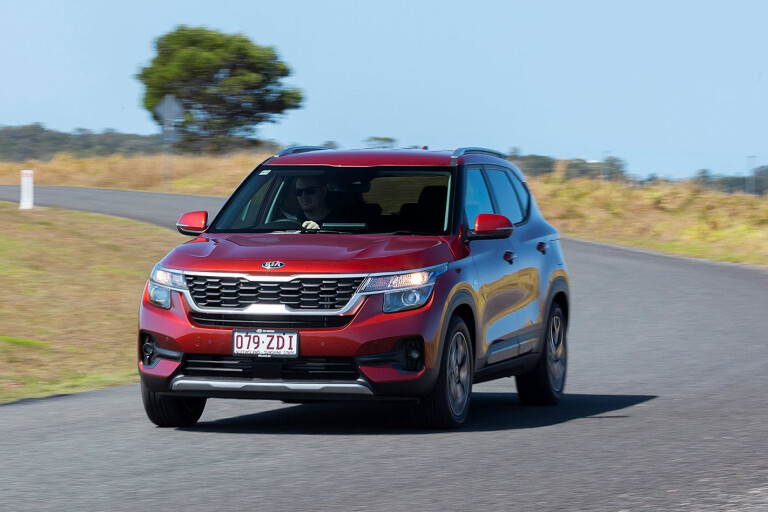
Score breakdown
Things we like
- Ride and handling, standard features, interior space and design
Not so much
- Thirsty turbo, hard GT Line wheels
What stands out?
The Kia Seltos is an attractive small SUV that is comfortable and quiet to ride in and fun to drive thanks to its suspension that has been tuned to suit Australian conditions. Turbocharged, all-wheel-drive versions have more than enough power and autonomous emergency braking is standard across the range. Kia’s seven-year warranty is one of the best available.
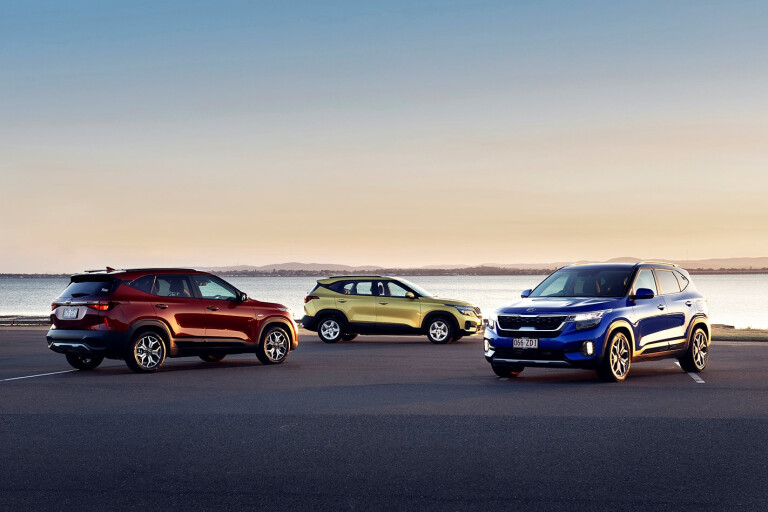
What might bug me?
You might wish for more grunt in a 2.0-litre petrol version – especially if you have driven the turbo.
What body styles are there?
Five-door wagon only.
The Seltos drives either its front, or all four, wheels depending on the version. It is classed as a small SUV, lower priced.
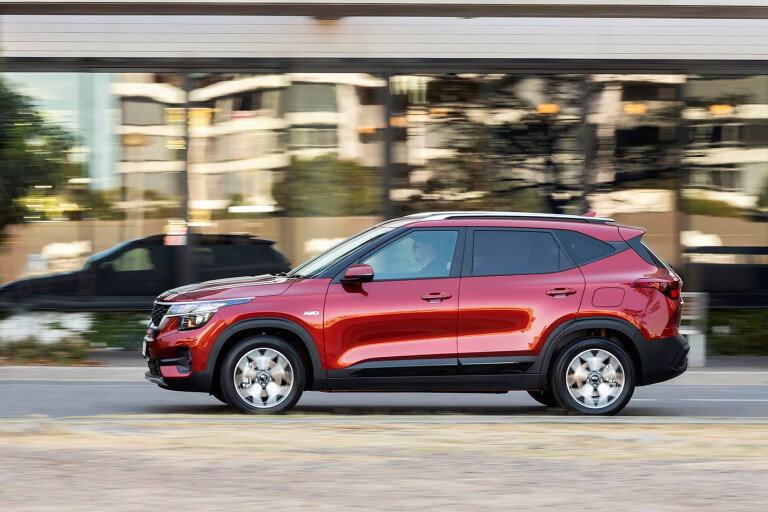
What features do all Seltos versions have?
- Colour touchscreen, auxiliary and USB input sockets.
- Bluetooth connectivity for phone calls and audio streaming, and Android Auto/Apple CarPlay that lets you display smartphone apps on the touchscreen and control them from there (or by voice).
- Sound system with at least six speakers.
- Reversing cameras with dynamic guidelines that predict your path, and rear parking sensors.
- Active safety features including autonomous emergency braking, forward collision warning, driver attention alert and lane keeping assist.
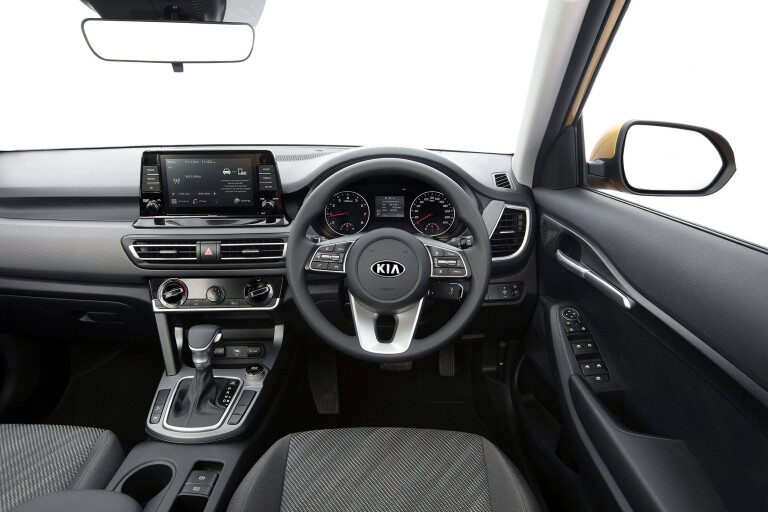
- Controls on the steering wheel for operating the cruise control, the sound system and phone calls.
- Daytime running lights, headlights that switch on automatically when it’s getting dark, rear fog lights.
- Air-conditioning.
- Roof rails, which make it easier to attach luggage systems.
- Shark fin antenna.
- An automatic transmission, and a trip computer that presents fuel use and distance information.
- Hill-start assist, which controls the brakes automatically to help you start from rest on an uphill slope.
- Downhill brake control, which can regulate speed automatically on steep down slopes when driving off-road.
- Six airbags: two directly in front of the driver and front passenger; one alongside each front occupant to protect the upper body; and a curtain airbag on each side protecting the heads of front and rear occupants.
- Seatbelt warnings that chime and illuminate when someone is sitting in a seat and not strapped in.
- Electronic stability control, which helps the driver to control an out-of-control car. All new cars must have this feature.
Every Kia Seltos is covered by a seven-year, unlimited kilometre warranty.
Which engine uses least fuel, and why wouldn't I choose it?
The 2.0-litre four-cylinder engine has an official economy rating of 6.8 litres per 100km (city and country combined) through its continuously variable transmission (CVT) automatic gearbox.
The 2.0-litre is a flexible engine that performs well in the city and cruises comfortably on the highway. The Seltos is the first Kia to come with a CVT, which helps make it more efficient.
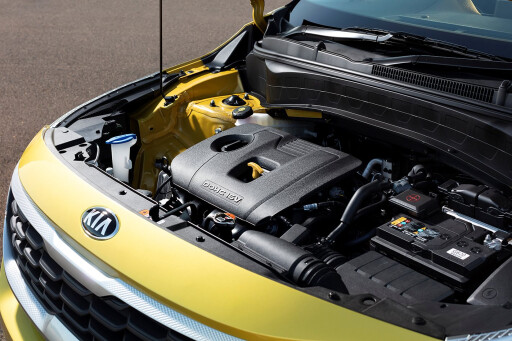
The main reason you wouldn’t choose this engine is because you want the sprightlier 1.6-litre four-cylinder turbocharged petrol engine available in the Sport+ and GT Line.
Another is that you want the added confidence that comes with all-wheel-drive (AWD) traction that’s only available with the 1.6-litre turbo – the 2.0-litre variants are front-wheel drive (FWD) only.
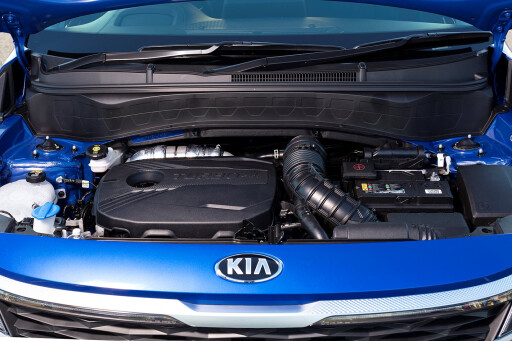
And you may also want the extra features available in the GT Line – the Sport+ is available with both engines.
The 1.6-litre turbo is the same engine as the one that powers the Cerato GT and is coupled with the same seven-speed dual-clutch automatic gearbox. It’s a little thirstier in the slightly heavier Seltos, with a combined official fuel economy of 7.6 litres/100km.
What key features do I get if I spend more?
The least costly Seltos, the Seltos S, has cloth seats, 8.0-inch touchscreen, 16-inch steel wheels with plastic hubcaps, space-saving spare wheel, one USB socket at the front, manual air-conditioning and the features of every Seltos.
It comes with the 2.0-litre petrol engine with CVT auto as standard.
For extra features, you could spend more on the Seltos Sport which, like the S, comes with the 2.0-litre petrol with front-wheel drive but adds:
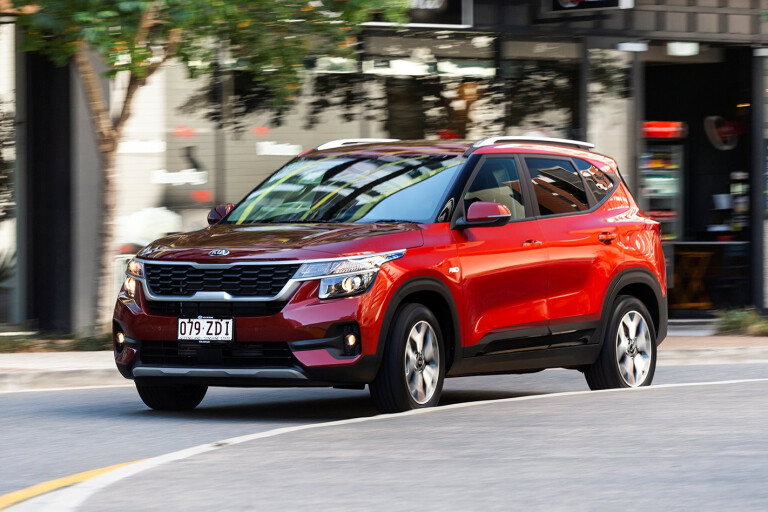
- A bigger 10.25-inch touchscreen with satellite navigation.
- Digital radio (DAB+).
- Additional USB socket.
- Air-conditioning that can be set so you have a constant temperature in the cabin.
- Tinted windows are tinted.
- Leather appointed steering wheel and gear shifter.
- Power-folding door mirrors.
- Front fog lights.
- 17-inch wheels made from lighter and more attractive aluminium alloy, and there is a full-size spare wheel in the boot.
For about $1000 extra, the S and Sport can be equipped with the Safety Pack brings a higher-grade radar and camera-based autonomous emergency braking system with pedestrian and cyclist detection, advanced smart cruise control, driver attention alert+ that also lets you know when a car in front drives off in case you’re distracted, electronic parking brake, and 15-inch rear disc brakes. It also brings electric folding door mirrors to the Seltos S.
The Seltos Sport+ brings the Safety Pack as standard, along with other advanced driver assist features including blind-spot detection, and new rear-cross traffic alert with auto braking. It also gains:
- Smart key with push button start that lets you open your Seltos and drive away without getting your keys out of your pocket.
- Smart remote start.
- Heated side mirrors.
- LED Interior lights.
- Auto-dimming rear-view mirror.
- Front parking sensors.
The Sport+ also has the option to upgrade to the 1.6-litre turbo AWD drivetrain for an additional $3500.
The range-topping Seltos GT Line comes with the 1.6-litre turbo AWD drivetrain as standard along with a host of extras including:
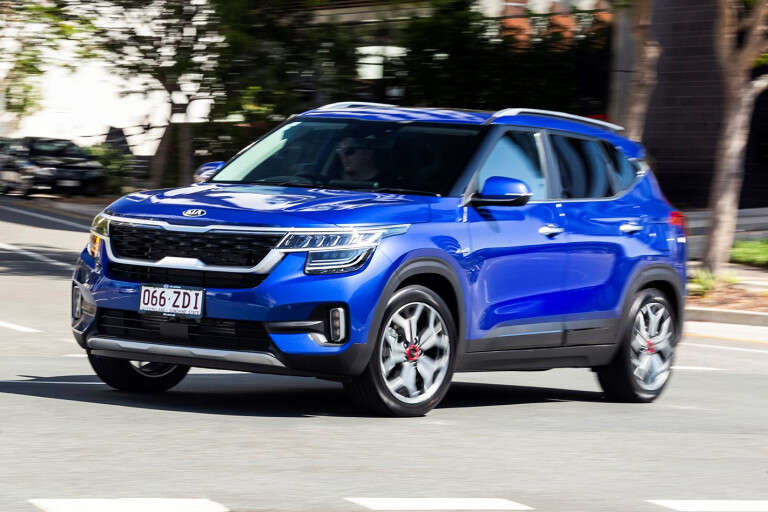
- A panoramic sunroof.
- Eight-speaker BOSE premium sound system.
- Interior sound mood lighting that changes with your chosen music.
- Fast wireless phone charger.
- Head-up display, premium (artificial leather) seats.
- Powered 10-way driver’s seat.
- Powered eight-way front passenger seat.
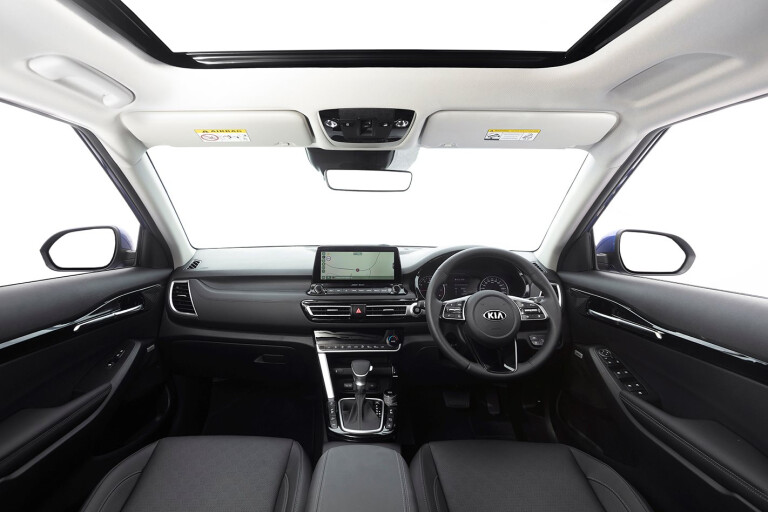
- Heated and ventilated front seats.
- 18-inch alloy wheels.
- LED exterior lighting including headlights, daytime running lights and front fog-lamps.
- Rain-sensing windscreen wipers.
- Additional safety technology including safe exit alert that will warn if there is any traffic or bicycles approaching from behind when the Seltos is stationary, and lane following assist that can track vehicles and road markings ahead to keep the car in-lane and a safe distance from any cars in front.
You can get a contrasting Cherry Black roof on a GT Line, though this comes without the sunroof.
Does any upgrade have a down side?
Ride quality can suffer over road imperfections on the GT-Lines bigger 18-inch wheels, which use lower-profile tyres with less sidewall flex to cushion you from bumps on the road.
You’ll spend more time at the petrol bowser with the 1.6-litre turbocharged engine in a Sport+ or GT Line.
Starbright Yellow is a standard colour on the Seltos. The other shades carry a premium paint charge of about $520.
How comfortable is the Seltos?
The Seltos’ cabin is roomy with instruments and controls laid out neatly and intuitively. The interior is well put together, but the build quality is let down a little by the hard plastic dashboard in the S and Sport versions.
Ride comfort is excellent for a small SUV. Drive a Seltos in Korea and the ride is soft and floaty, however this would result in plenty of bounce and body roll on Australian roads so Kia Australia has retuned the suspension to suit local conditions and the result is a good compromise between comfort and handling.
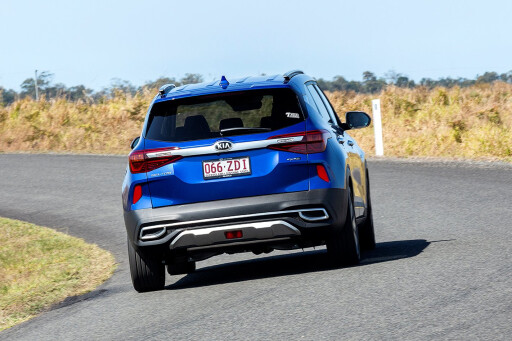
The Seltos rides over bumps well with little secondary bounce and body roll is surprisingly subdued for a high-riding SUV. The only downside is the occasional jarring through the 18-inch wheels in the GT Line, whose thinner tyre walls provide less cushioning between the road and rims.
MORE: Kia Seltos S review
As well as the bigger rubber, the 2.0-litre front-wheel drive versions provide a more comfortable ride because their suspension isn’t as firm as the all-wheel-drive versions.
The Seltos’ cabin is quiet, with little suspension, tyre or wind noise intruding.
The infotainment system is very user friendly, with all but the entry-level S coming with a large 10.25-inch screen. That said, you’ll have no problem viewing the S’s 8.0-inch display. The system allows for a split screen to view and operate different functions at once, while Android Auto and Apple CarPlay allow for easy, and legal, operation of music, podcast and navigation apps.
MORE: Kia Seltos GT-Line review
The Seltos also allows two phones to be synced via Bluetooth at the same time. This means you can have your phone connected to receive phone calls while a passenger can play music through theirs.
What about safety in Seltos?
The Seltos arrived in Australia with the most advanced safety tech in any Kia.
The standard autonomous emergency braking (AEB) in the S and Sport can initiate a full emergency stop automatically from speeds up to about 80km/h if the system senses you are in danger of driving into something. First it sounds a warning; if you ignore that, it applies the brakes partially; and if you do not intervene it applies maximum braking. (At speeds between 80 and 180km/h it warns and brakes partially, but it will not brake as hard as possible on its own.)
Driver attention alert that detects and warns you if you’re driving a little erratically (a sign of fatigue) is also standard. As is lane-keeping assist, which can detect the lines on the road and help steer the Seltos within them is also standard.
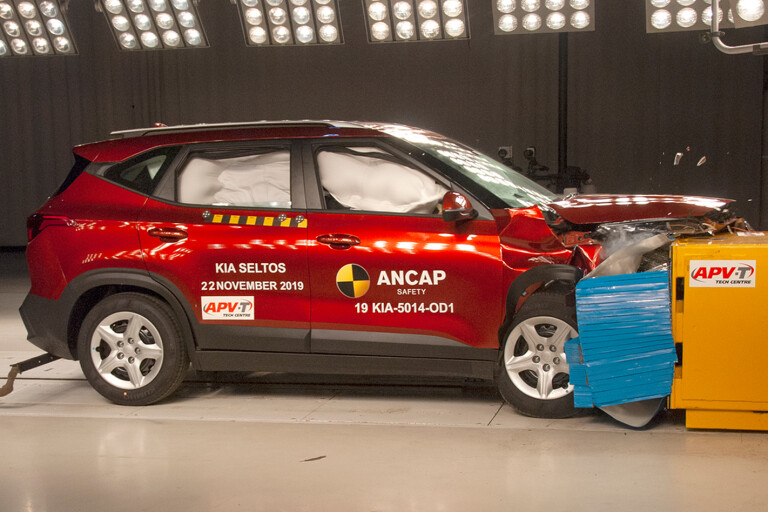
Every Seltos has six airbags: two directly in front of the driver and front passenger; one alongside each front occupant to protect the upper body; and a curtain airbag on each side protecting the heads of front and rear occupants.
There two ISOFIX child restraint anchor points at the rear and three top-tethers.
You also get a reversing camera and a seatbelt warning for every seat – a simple but valuable feature for those with children old enough to unfasten their belts. Dusk-sensing headlights, and the mandatory stability control complete an excellent standard package.
Both the S and Sport are available with an optional Safety Pack that for $1000 adds the higher grade, radar and camera-based ‘Fusion II AEB’ with pedestrian and cyclist detection. This system is standard in the Sport+ and GT Line and also includes advanced smart cruise control that slows to a stop in heavy traffic, electronic parking brake, and 15-inch rear disc brakes.
The Sport+ and GT-Line come with the Safety Pack as part of price along with blind spot detection that alerts you to a vehicle approaching from behind in the next lane via a light in the door mirror. If you indicate to change lanes an audible warning will sound so you don’t cut the vehicle off.
Both versions also get rear cross-traffic collision avoidance assist, which detects a car coming from the side when you’re reversing and automatically stops the Seltos if necessary. Driver Attention Alert+ detects signs of fatigue and alerts the driver if the vehicle in front moves away from a stop situation, such as a set of lights.
The GT-Line also has safe exit alert, which warns occupants of traffic (including bicycles and motorcycles) before they open their door into the road, and lane following assist that controls acceleration, braking and steering and can track vehicles and road markings ahead to keep the car in-lane and a safe distance from any cars in front.
The Australasian New Car Assessment Program (ANCAP) awarded the Kia Seltos a five-star rating in October 2019.
I like driving - will I enjoy this car?
Yes. The Kia Seltos is among the most enjoyable compact SUVs available.
The electrically assisted power steering feels just right. It’s easy to steer but brings you a good sense of connection with the road, which is satisfying and inspires confidence.
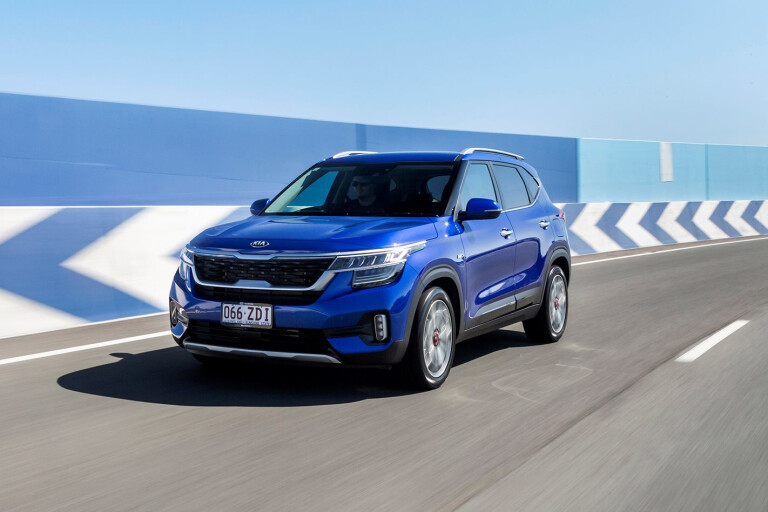
A three-step Drive Mode Select system lets you adjust the weight of the steering. It also adjusts how immediately the car reacts to your pressure on the accelerator pedal, through the engine and auto gearbox. There are relaxed Normal and Eco modes, and an aptly named Sport mode.
The Seltos has firm but comfortable suspension, which helps it respond quickly to steering inputs and to corner with relatively little body roll. The firmness also prevents the body from bobbing on the springs after the car hits a big bump on the road.
MORE: Kia Seltos Wheels review
The 1.6-litre turbocharged petrol engine has more grunt than the 2.0-litre petrol, but the 2.0-litre engine still provides more than enough power for highway driving. Its CVT auto does a good job in distributing power, however, as is the case with such transmissions, it can be a little thrashy when accelerating through higher speeds or coming down hills.
How is life in the rear seats?
The Seltos has generous 965mm of legroom, which is 30mm more than the Hyundai Kona.
The seats offer good back, under-thigh and lateral support, with enough headroom even for adults. Cushions are comfortable, and the backrest can recline slightly.
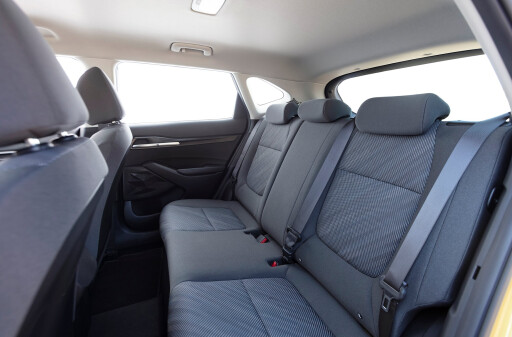
Kia Seltos S
Frontal vision is good as is the view out of the side windows, and the rear of the cabin is well isolated from tyre and suspension noise.
There are ISOFIX anchor points by each door, and three top tethers to fit up to three child seats.
Only the GT-Line has rear heating and cooling vents, located behind the centre console.
How is it for carrying stuff?
The Seltos S, which comes with a narrow space-saving spare wheel under the boot floor, has a class-leading 498-litre boot that’s bigger than the cargo area in most medium SUVs including the Kia Sportage’s 466 litres.
The Sport, Sport+ and GT Line have more convenient full-size spares, the trade-off being boot space is reduced to 433 litres that’s still above average for a small SUV.
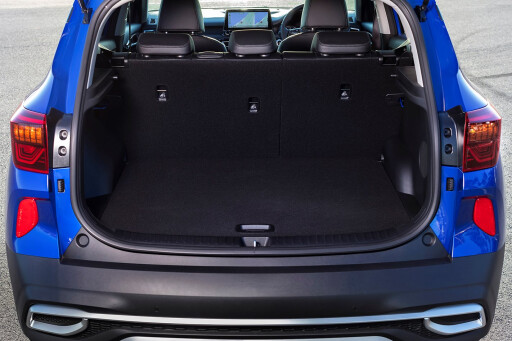
The cargo area expands to 1393 litres with the 60:40 rear seatbacks folded down.
A one-piece tailgate lifts upwards to reveal a large opening, which makes it easy to load bulky items.
The 2.0-litre front wheel drive Seltos versions have a handy 1100kg braked towing capacity, with the 1.6 litre AWD versions able to tow a 1470kg braked load. Towball weight for each is 130kg.
Where does Kia make the Seltos?
All Australian Kia Seltos versions are built at Kia’s Gwangju factory in South Korea.
What might I miss that similar cars have?
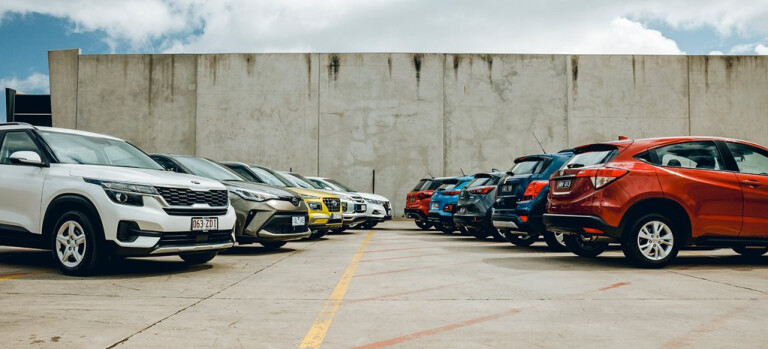
Not much, aside from the option of more fuel efficient diesel powertrain. Diesel versions of the Jeep Compass and Mazda CX-3 consume less than 6.0L/100km. Or maybe an electrified version as available with the Toyota C-HR Hybrid and Hyundai Kona Electric.
Perhaps more off-road capability like you get with a Subaru XV or Suzuki Jimny.
Other comparatively priced and equipped small SUVs worth considering include the Citroen C3 Aircross, Honda HR-V, Mitsubishi ASX.
I like this car, but I can't choose which version. Can you help?
We think mid-priced Seltos Sport+ with the 2.0-litre FWD drivetrain is the pick of the bunch. It costs about $2500 more than the Sport with the Safety Pack, which seems good value when you think of the additional features it brings.
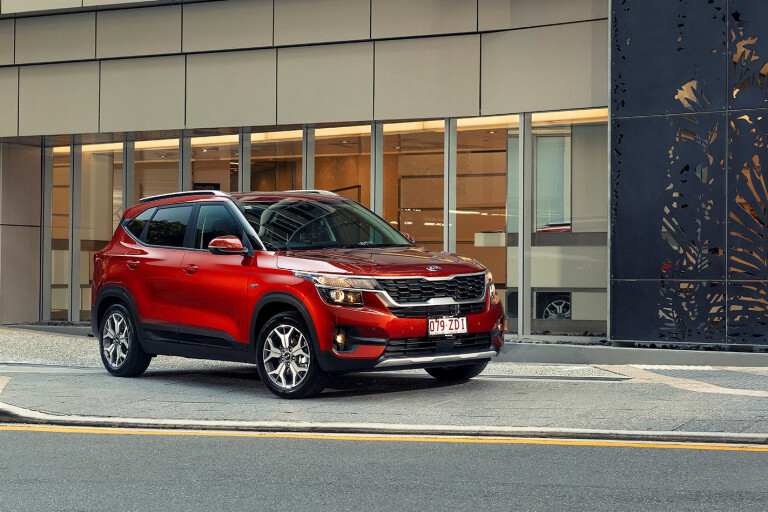
Are there plans to update this model soon?
The Kia Seltos arrived in Australia in October 2019 as Kia’s newest model featuring equipment that we’ve yet to see in the brand. So don’t expect to see any updates until 2021 at the earliest.
Score breakdown
Things we like
- Ride and handling, standard features, interior space and design
Not so much
- Thirsty turbo, hard GT Line wheels

COMMENTS